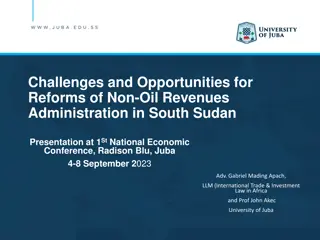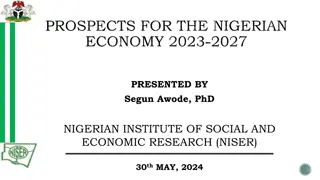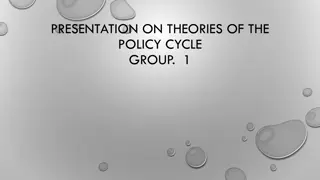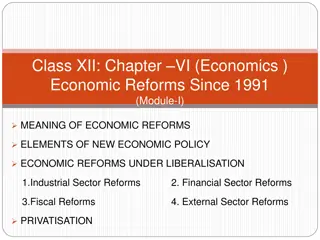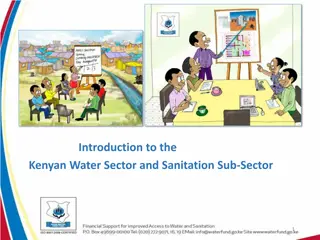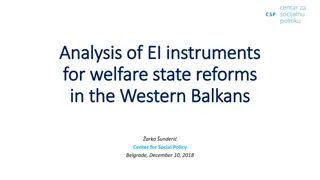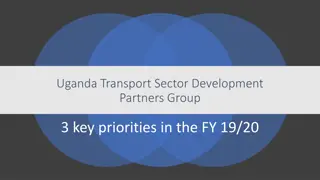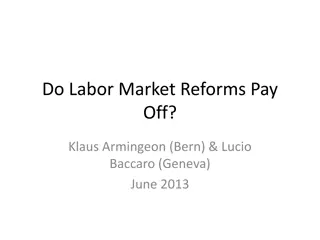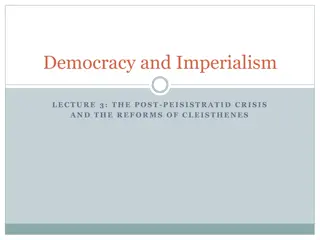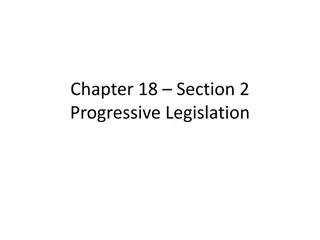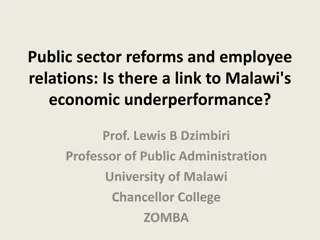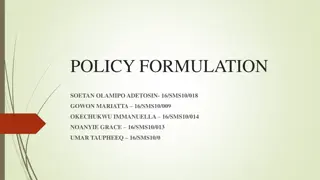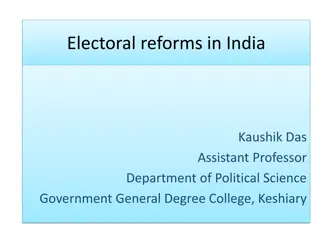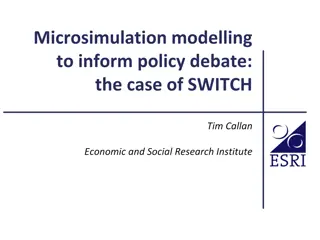Challenges and Opportunities for Reforms of Non-Oil Revenues Administration in South Sudan
The presentation highlights the reliance on oil revenues in South Sudan and the need for reforms in non-oil revenue administration. It discusses sources of non-oil revenue, factors hindering revenue mobilization, and opportunities for reforms to diversify the economy. The objectives of non-oil reven
3 views • 23 slides
Gender Equity and Social Inclusion Policy Overview
This overview highlights the Gender Equity and Social Inclusion (GESI) Policy promoted by the Department of Personnel Management in Papua New Guinea. The policy aims to ensure fair participation of disadvantaged individuals in employment and opportunities, along with social inclusion to realize the
1 views • 18 slides
Prospects for the Nigerian Economy 2023-2027: Insights and Analysis
Nigeria's economic journey from 1999 to the present, highlighting key administrations, policy shifts, and economic reforms. The period saw the establishment of democratic governance, economic diversification efforts, infrastructural investments, and bold reforms such as fuel subsidy and exchange rat
0 views • 39 slides
Government Services Reforms in Vanuatu Public Service Commission
Chairman Martin Mahe is leading innovative reforms in the Vanuatu Public Service Commission to improve service delivery. The focus is on a robust legislative framework, clear procedures in the Public Service Staff Manual, rigorous performance management, and policy development for effective decentra
0 views • 10 slides
Financial Sector Reforms in India: An Overview
In the early 1990s, India witnessed significant reforms in its financial sector, addressing issues like lack of transparency, extensive regulation, and financial repression. Key reforms included setting up expert committees, reducing SLR and CRR, implementing prudential norms, and deregulating inter
0 views • 18 slides
Evolution of Reserve Bank of India: A Historical Overview
The Reserve Bank of India, established in 1935 and headquartered in Mumbai since 1937, has played a crucial role in India's financial landscape. From nationalization in 1949 to financial reforms in 2000, this summary covers key milestones in RBI's history, including regulatory expansions, nationaliz
0 views • 18 slides
Understanding Theories of the Policy Cycle in Policy Analysis
The policy cycle theory describes the evolution of policy issues from inception to evaluation, impacting scientific research and policy formulation. It outlines stages from the 1950s, influenced by Lasswell's seven-stage model, serving as a framework for organizing policy processes. Despite the line
3 views • 30 slides
Overview of Social Register of Mauritius and Marshall Plan against Poverty Reforms
The Social Register of Mauritius (SRM) is a crucial tool for registering and identifying the poor, aiding policy-makers in creating effective pro-poor policies. This overview of UNDP-supported anti-poverty reforms in Mauritius highlights the objectives and improvements brought about by SRM, addressi
0 views • 30 slides
Public Expenditure Management and Performance Evaluation
This content discusses the importance of Public Expenditure Review (PER) as a core diagnostic tool in evaluating government finances and guiding spending decisions. It emphasizes the analysis of public expenditures over time to align with policy priorities and achieve desired outcomes, highlighting
0 views • 33 slides
Economic Reforms Since 1991: Liberalisation and Industrial Sector Reforms
Economic reforms initiated in 1991 under the New Economic Policy focused on liberalisation, privatisation, and globalisation to accelerate economic growth. Liberalisation involved deregulation of the industrial sector, abolishment of industrial licensing, reduction of public sector industries, de-re
0 views • 9 slides
Progressive Reforms and Social Movements in American Life
The Progressive era in American history saw significant reforms in three key areas: Temperance (alcohol), Women's Rights, and Civil Rights. Various laws, organizations, and individuals played crucial roles in driving these reforms, such as the 18th Amendment, the National Woman's Party, the 19th Ame
0 views • 7 slides
Insights on Long-Term Care Policies in Italy: National Reforms to Local Changes
Research presented at the 4th International Conference on Evidence-based Policy in Long-term Care delves into the evolution of Long-Term Care (LTC) policies in Italy from national debates to local innovations. It covers the impact of economic crises, trends in LTC across Europe, and the interplay be
0 views • 17 slides
Evolution of the Kenyan Water Sector: Reforms and Innovations
The Kenyan water sector has undergone significant reforms and institutional changes over the years. Beginning with the establishment of the Ministry of Water in 1974, followed by the enactment of the Water Act 2002 and subsequent reforms, new institutions such as WASREB, WSBs, WRMA, and WSPs were cr
0 views • 15 slides
Challenges in Policy Implementation and Lessons Learned
The content discusses the challenges faced in policy implementation, focusing on the gap between policy design and execution. It highlights key steps in policy-making, reasons for implementation failures, and factors influencing successful policy outcomes. Examples from Zambia's National Science and
0 views • 14 slides
Structuration Analysis of Central Government Accounting Practices and Reforms in Emerging Economies: A Study from Nepal
Delve into the nuances of central government accounting practices and reforms in emerging economies, focusing on Nepal. The study explores why key stakeholders resist externally-driven changes, investigates the unintended consequences of reforms, and highlights the role of organizational actors in s
0 views • 21 slides
Need for Changes in the Law of Evidence: Perspectives and Reforms
Information by which facts are proved forms the essence of the law of evidence, regulating how facts are established in courts. This article discusses the exclusionary ethos, statutory reforms, challenges with hearsay evidence, and examples of reforms from different countries like England, Wales, Au
0 views • 18 slides
Evaluation of Labour Reforms 1945-51 and Their Impact on Poverty Alleviation
Following their landslide victory in 1945, the Labour Government under Clement Attlee implemented a series of reforms aimed at addressing poverty in post-WWII Britain. The Beveridge Report highlighted the giants of poverty - Want, Disease, Idleness, Squalor, and Ignorance - serving as the blueprint
0 views • 29 slides
Analysis of EU Instruments for Welfare State Reforms in Western Balkans
Analysis of European Union instruments, such as the European Semester, in promoting welfare state reforms in the Western Balkans. Discusses policy harmonization, coordination, and funding mechanisms through the EU structural funds. Highlights how the EU governance mechanisms impact domestic welfare
0 views • 13 slides
Evolution of Child Welfare Policy in England
Since the public inquiry into the death of Maria Colwell in 1973/74, public inquiries have been instrumental in driving policy, practice, and legislative changes in child welfare and protection in England. The tragic cases of Maria Colwell and Victoria Climbe led to significant reforms, including th
0 views • 18 slides
Agricultural Reforms in Mauritius: Transforming the Sugar Sector for Economic Resilience
Mauritius embarked on agricultural reforms as part of its Government Economic Reform Programme in 2006, with a focus on transforming the sugar sector and enhancing food security. The process involved organizational, legal, and policy changes aimed at improving performance measures and addressing cha
0 views • 7 slides
EHEA Ministerial Conference - Paris 2018 Agenda
The EHEA Ministerial Conference in Paris 2018 includes various sessions and discussions on the future of higher education in Europe. The agenda features welcome sessions, ministerial allocutions, policy forums, and adoption of communiqués focusing on fundamental values, inclusiveness, and EHEA refo
0 views • 8 slides
Uganda Transport Sector Development Partners Group Priorities FY 19/20
This document outlines key priorities identified by the Uganda Transport Sector Development Partners Group for the fiscal year 2019/2020. The priorities include institutional framework optimization, legislative reforms, preparation of policy reports, and capacity-building initiatives within the tran
0 views • 6 slides
Exploring China's Dynasties and Cultural Contributions
Ming Dynasty marked by agricultural reforms, Confucian revival, and Zheng He's voyages; Qing Dynasty's rule following Manchu invasion with emphasis on Confucian beliefs and economic reforms; Chinese inventions and zodiac as part of rich cultural heritage. Policy of isolationism led to limited Europe
0 views • 15 slides
Overview of Aged Care Reforms in May 2014
Aged Care Reforms in May 2014 introduced significant changes to the aged care sector in Australia. The reforms aimed at providing quality care for older Australians, reducing red tape, and enhancing services such as Home Care Packages, MyAgedCare, and the Australian Aged Care Quality Agency. Changes
0 views • 45 slides
Early Childhood Education and Care in Croatia: Overview and Reforms
Early Childhood Education and Care (ECEC) in Croatia has evolved over the years with reforms targeting parental leave, family benefits, and preschool programs. The system includes nurseries, kindergartens, and preschools, with public providers dominating. Recent reforms have introduced quality stand
0 views • 19 slides
Overview of Civil Service Pension Scheme Reforms
Explore the recent reforms in the Civil Service Pension Scheme, covering changes in contributions, introduction of a new pension scheme, reasons for the reforms, current scheme details, and the transitioning stages. Understand the impact on pension benefits and find resources for further information
0 views • 23 slides
Labor Market Reforms and Unemployment: A Detailed Analysis
Labor market reforms and their impact on unemployment rates are examined through a Difference-in-Differences analysis in this study led by Armingeon and Baccaro in June 2013. The research questions whether liberalizing reforms actually reduce unemployment and increase employment levels. The findings
0 views • 13 slides
Athenian Democracy: Post-Peisistratid Crisis and Cleisthenes's Reforms
After the rule of Peisistratus, Athens faced a crisis that led to the reforms of Cleisthenes. Solon's reforms had set a foundation, but tensions remained between rich and poor. The Solonic constitution established a system involving magistrates, the Areopagus Council, and the Assembly. The interplay
0 views • 22 slides
Morality in UK Drug Policy: Policy Constellations Analysis
Morality plays a significant role in shaping drug policy in the UK, as revealed by the research conducted by Professor Alex Stevens at the University of Kent. The study investigates the moral commitments underlying different policy positions in UK drug policy debates, highlighting five ethico-politi
0 views • 19 slides
Reforms in GCSE, AS, and A-Level Education in England
Reforms in GCSE, AS, and A-Level qualifications in England aim to align the educational system with global standards, enhancing the rigor of content and assessments. Changes include new grading scales, stand-alone AS qualifications, and expanded subject offerings. These reforms impact students start
0 views • 30 slides
Industrial Policy: The Old and The New - Insights by Dani Rodrik
Industrial policy, as presented by Dani Rodrik in May 2019, emphasizes the importance of empirical work, the differences between old and new policies, and the targets industrial policy should focus on. The theoretical arguments for industrial policy highlight market imperfections, learning spillover
0 views • 26 slides
Progressive Reforms in the United States
Progressive movements in the United States during the late 19th and early 20th centuries led to significant legislative changes at the federal, state, and municipal levels. Efforts focused on expanding the role of government in social welfare programs, municipal reforms to combat corruption, innovat
0 views • 10 slides
Public Sector Reforms in Malawi: Impact on Economic Performance
The presentation explores the link between public sector reforms and economic underperformance in Malawi. It discusses the history of public sector reforms in Africa and Malawi, employee relations, and various generations of reforms. The context of Malawi's economic realities at independence and res
0 views • 63 slides
Understanding Policy Formulation: Key Concepts and Approaches
Policy formulation is a crucial step in the policy-making process, involving identifying and crafting policy alternatives to address various issues. This phase requires participants to define policy problems, develop alternatives, and select the most feasible solutions based on criteria such as feas
0 views • 12 slides
Understanding Electoral Reforms in India
Electoral reforms in India are crucial for ensuring free and fair elections, which are fundamental to the success of democracy. This article delves into the need for electoral reforms in India, discussing issues such as money power, muscle power, criminalization in politics, and the misuse of offici
0 views • 15 slides
Inclusion Programme & SEND Reforms in Sheffield Update for School Governors (June 2016)
Sheffield is undergoing significant reforms in its inclusion programme and SEND services, aiming to provide better support for vulnerable young people and their families. The vision includes a shift towards a locality model, ensuring high-quality inclusive provision, robust mental health support, an
0 views • 13 slides
Microsimulation Modelling to Inform Policy Debate: The Case of SWITCH
This presentation discusses the usage of the SWITCH microsimulation model to inform policy debates by simulating the impact of tax and welfare policy reforms on household incomes and work incentives. It covers the areas investigated using SWITCH, selected users of SWITCH research, and the role of SW
0 views • 21 slides
NSW Consent Reforms: Legislative Changes and Impacts on Sexual Assault Laws
In the past 40+ years, the NSW legislative landscape has seen significant changes in addressing sexual assault, culminating in the recent Crimes Legislation Amendment (Sexual Consent Reforms) Act 2021. These reforms implement recommendations, introduce affirmative consent model, and enhance provisio
0 views • 32 slides
Big Bang Reforms in China's Financial Sector by Sunanda Sen
This article discusses significant reforms in China's financial sector, including changes in capital account regulation, balance of payments components, financial instabilities, and offshore centers like Shanghai FTZ. The reforms cover topics such as exchange rate adjustments, deregulated interest r
0 views • 8 slides
Deep Dive into Nikita Khrushchev's Reforms and Removal from Power
Explore the transformative reforms and eventual downfall of Nikita Khrushchev during his tenure from 1956-1964. Delve into topics like Cold War dynamics, agricultural reforms, de-Stalinization, control of Eastern Europe, and reasons for his removal from power. Uncover the debates surrounding the ext
0 views • 7 slides
